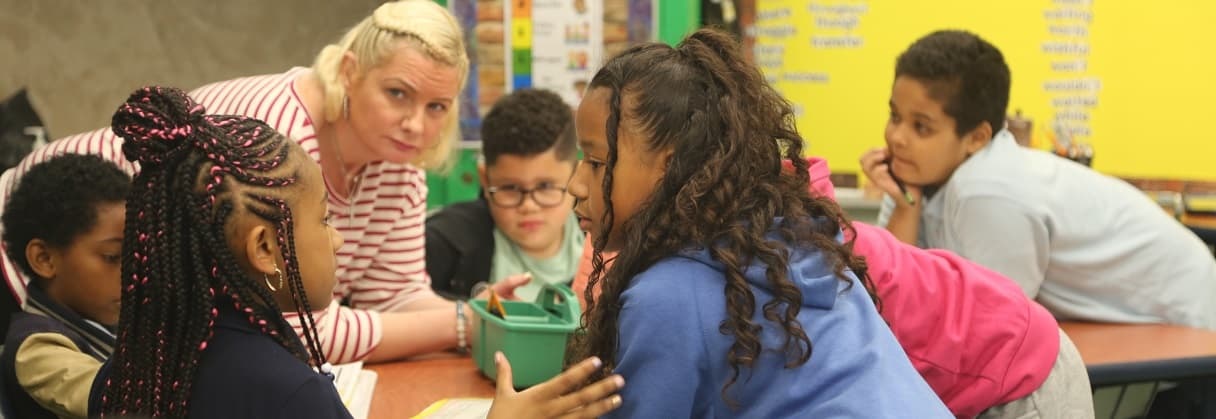
In Our Classrooms
We’re doubling down on an approach that we know works—giving our teachers the resources to support our students' social-emotional skills and well-being, and, as a result, reducing our reliance on suspensions or punitive discipline. If students learn how to resolve conflicts and build relationships with each other and staff, they are less likely to act out.
More information about student supports by grade level, below:
Elementary School Supports
All elementary schools will receive support to teach their students how to develop healthy relationships through Social-Emotional Learning (SEL) curricula. SEL has been proven to improve students’ academic performance by prioritizing communication, empathy and problem solving.
Building on principles and practices already used in our Pre-K programs, teachers from 3K – 5th grade will receive training and materials to help students grow their emotional and social skills. Activities like daily meet-ups between students and a “buddy-up” system will help children to learn how to get along with others.
Offering these lessons in elementary school allows students to build on the foundation and better develop during formative years.
The Department of Education will offer the SEL curriculum in partnership with National University System’s Harmony program. Schools also receive support to integrate SEL and Academics in schools to develop safe, caring, and affirming learning environments and to deepen learning experiences for all students. These supports are offered through professional learning with the 4Rs curriculum (Reading, Writing, Respect & Resolution) that engages the imagination and creativity of children in grades PreK-5 to help develop critical skills including empathy, community building, and conflict resolution. We also offer New Principal Institutes to support schools with the implementation of Social Emotional Learning and the Youth SEL Empowerment initiative which students across New York City Public Schools learn about Social Emotional Learning and become leaders in their school communities.
Middle and High School Supports
Middle schools across the city will reinforce SEL tenets by implementing Restorative Justice Practices. Restorative Justice Practices de-emphasize the reliance on solely traditional discipline and punishment. Instead, students are also encouraged to activate SEL skills by focusing on emotion identification, conflict resolution and problem solving.
The use of these skills become part of a school’s daily practice. Students are taught to become leaders in their lives, and adults are trained in the restorative framework, recognizing that outside factors often have significant impacts on a students’ day-to-day response and those responses must be addressed through multiple approaches.
Citywide Reforms
We have made other reforms impacting issues like mental health and the role of police.
NYPD-DOE Memorandum of Understanding
A new NYPD-DOE Memorandum of Understanding (MOU) governing police engagement in schools was adopted after a three-year collaborative process. The MOU clarifies the roles of the NYPD and the DOE in addressing school misconduct. It stresses our joint commitment to ensuring that schools are safe havens for students.
NYPD Patrol Guide
We changed the police patrol guide, given to all NYPD patrol officers, to significantly limit in-school arrests for low-level offenses, and limits allowable circumstances for in-school arrests to felony crimes, sex offenses, crime where there is an immediate risk of escape, and similar situations.
The guide also reiterates that—in case of an in-school arrest—a principal or similarly trusted adult staff member will serve as the in-school student advocate until a parent or guardian arrives.